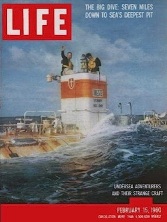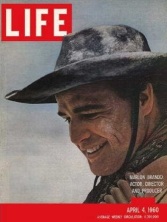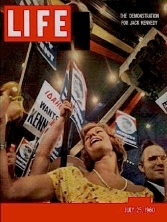Life in 1960
Posted: 16/04/2012 Filed under: Films, History, Magazines | Tags: 1960 Democratic National Convention, Aliens, Deepsea Challenger, Don Walsh, Guam, Jacques Piccard, James Cameron, John F Kennedy, Life, Mariana Trench, Marlon Brando, One-Eyed Jacks, The Terminator, Titanic, Trieste Bathyscaphe Leave a comment

 I was an avid reader of Life as a teenager. There was always a pile of old copies of Life in my school library, which was weird given that it was an American magazine and my school was in a little market town in rural England. I’ve no idea how they came to be in the library. This was in the late 1970s and most of the magazines were from the 1960s, so I guess somebody must have left them there years earlier. They were far from pristine – pages torn, pages missing, spunking cocks drawn over people’s faces – but that didn’t dampen my enthusiasm for them. Spending study periods flicking through dog-eared copies of Life was one of the things that first made me want to become a magazine journalist.
I was an avid reader of Life as a teenager. There was always a pile of old copies of Life in my school library, which was weird given that it was an American magazine and my school was in a little market town in rural England. I’ve no idea how they came to be in the library. This was in the late 1970s and most of the magazines were from the 1960s, so I guess somebody must have left them there years earlier. They were far from pristine – pages torn, pages missing, spunking cocks drawn over people’s faces – but that didn’t dampen my enthusiasm for them. Spending study periods flicking through dog-eared copies of Life was one of the things that first made me want to become a magazine journalist.
The three covers above are all from the year 1960. Click on the link to go to the original article at Google Books.
The Trieste bathyscaphe – US Navy Lieutenant Don Walsh writes about his remarkable journey in the Trieste bathyscaphe with Swiss oceanographer Jacques Piccard. They took Trieste to the bottom of the Mariana Trench (near the island of Guam), which is the deepest point of the world’s oceans, reaching a depth of 36,000 feet (roughly seven miles down). The feat had never been repeated until just last month, when film director James Cameron (“The Terminator”, “Aliens” and “Titanic”) made the Jules Verne-esque trip in the Deepsea Challenger.
Marlon Brando – Interviewed on the set of “One-Eyed Jacks”, the only movie Brando directed. “I have no respect for acting,” he harrumphs. “Acting, by and large, is the expression of neurotic impulse. Acting is a bum’s life. You get paid for doing nothing and it means nothing.”
The 1960 Democratic National Convention – The Democratic Party select John F Kennedy as its candidate in the 1960 presidential election. “To nominate its youngest candidate, the party elbowed its elder statesmen, broke several taboos and cut loose from a large part of its past,” read the magazine’s editorial that week. “It now invites the country to do the same.”
